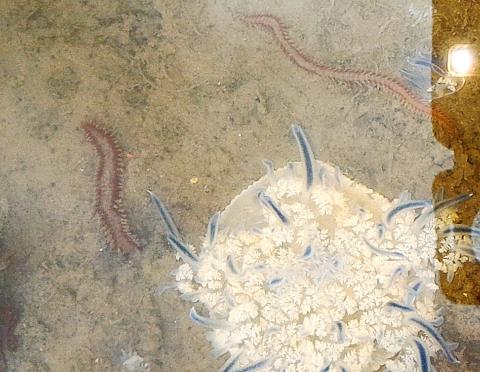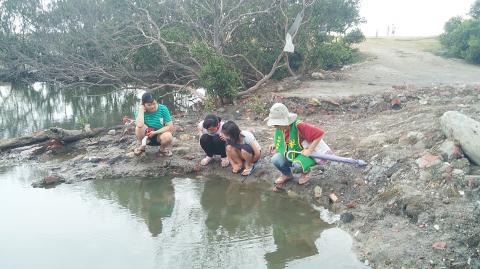The outfall of the Linyuan ocean wetland park in Kaohsiung has recently been overflowing with bristleworms. A conservation volunteer who came into contact with a bristleworm was left in pain for between four and five days.
The Linyuan ocean wetland park is also known as “Jellyfish lake” due to its upside-down jellyfish. Recently, there has been the addition of bristleworms. Although, the two are separate species, they share a similar characteristic: both possess a mild poison. President of the Linyuan mangrove forest conservation society, Su Wen-hua, says during the summer holiday, children are occasionally seen playing in the water and called on them not to do so, in order to avoid coming into contact with bristleworms or jellyfish by accident.
Su says bristleworms are often found in salt lakes. Due to fish becoming more prevalent in the wetland park, there is an abundant supply of food for the bristleworms, which is why they are assembling in ever larger numbers. Because bristleworms like to move around in water, they currently only exist in the outfall of the Linyuan ocean wetland park. Su emphasised, bristleworms are not harmful. In fact their diet mainly consists of fish carcasses and organic detritus. For this reason they are also known as “sweepers,” since they improve they quality of water.

Photo: Hung Chen-hung, Liberty Times
照片:自由時報記者洪臣宏
A conservation volunteer, using their own body to test the poison, discovered the sting from an upside-down jellyfish will last for over a week and the bristleworm’s sting will last for between four and five days, although both are not easily provoked. Su said capturing fish is forbidden at the wetland park and he hopes that visitors will not try to flip over upside-down jellyfish or bristleworms, or play in the water, so as to avoid being stung.
(Liberty Times, translated by Edward Jones)

Photo: Hung Chen-hung, Liberty Times
照片:自由時報記者洪臣宏
高雄林園海洋濕地公園出水口最近滿布剛毛蟲,有保育志工碰觸後痛了四、五天。
林園海洋濕地公園因倒立水母而有「水母湖」之稱,最近又多了剛毛蟲,兩個不同物種卻有著一個相同特性,就是都具有微毒性。林園區紅樹林保育學會理事長蘇文華說,正值暑假偶見學童戲水,呼籲不要下水以免誤碰。
蘇文華說,剛毛蟲常見於潟湖,濕地公園的魚類愈來愈多,剛毛蟲食物來源充足,才會愈聚愈多。因喜歡在流動水域生存,目前只存在林園海洋濕地公園出水口。他強調,剛毛蟲不是害蟲,事實上牠以魚屍等腐質有機物為食,有「清道夫」之稱,可以改善水質。
有保育志工「以身試毒」,發現被倒立水母螫到會痛上一星期,剛毛蟲也會痛個四、五天,都不是好惹的。蘇文華說濕地公園禁止捕魚,他也希望遊客不要去抓倒立水母、剛毛蟲或戲水,以免被螫到。
(自由時報記者洪臣宏)

A: I’m glad that the Grammys will honor the late pop diva Whitney Houston with a Lifetime Achievement Award. Who are this year’s leading nominees? B: Kendrick Lamar is leading the nominations with nine nods, followed by Lady Gaga with seven nods. Bad Bunny, Sabrina Carpenter and Leon Thomas each gained six nods. A: I heard that the song “Golden” from global animated blockbuster KPop Demon Hunters received three nominations, including Song of the Year. B: Blackpink’s Rose and Bruno Mars’ “APT.” also received major recognition with multiple nominations, including Record of the Year, setting a milestone for

It graced statues, colored coffins, and decorated artifacts. It is Egyptian blue, the world’s oldest-known synthetic pigment born in ancient Egypt. Despite its name, it is not limited to a single hue. It ranges from deep blue to greenish tones, often glowing with an almost unearthly brilliance. __1__ In response, the ancient Egyptians developed a synthetic alternative. Not only was it visually striking, but it was also more affordable than imported indigo or natural lapis lazuli. Traces of the pigment have been discovered far beyond Egypt, from wall paintings in Pompeii to tiles in Mesopotamia. However, Egyptian blue began to fall

Bilingual Story is a fictionalized account. 雙語故事部分內容純屬虛構。 Just yesterday, the boy had helped hang the lucky red couplets. Tonight, as firecrackers signaled the New Year, he lay in bed burning with a surging fever. The herbalist checked the boy’s pulse and went still. “The only cure is in the county town across the mountains,” he said. “But the snow is deep, and the shops are shuttered until the Fourth Day.” The boy’s father looked at the window. “I will go.” “The roads are impassable for a cart,” the herbalist warned. “And too far for a man on foot.” The concerned neighbor

Contrary to popular belief, glass bottles may pose a greater microplastic risk than plastic ones. A recent study found that beverages stored in glass bottles can contain up to 50 times more microplastic particles than those in plastic containers. Researchers traced most of the contamination to the paint on the outside of the metal caps. The particles found in the drinks matched the cap’s coating in both color and composition. Experts suggest the issue may result from microscopic scratches that form as caps rub against each other during transport or storage. Such scratches can damage the painted coating, leading